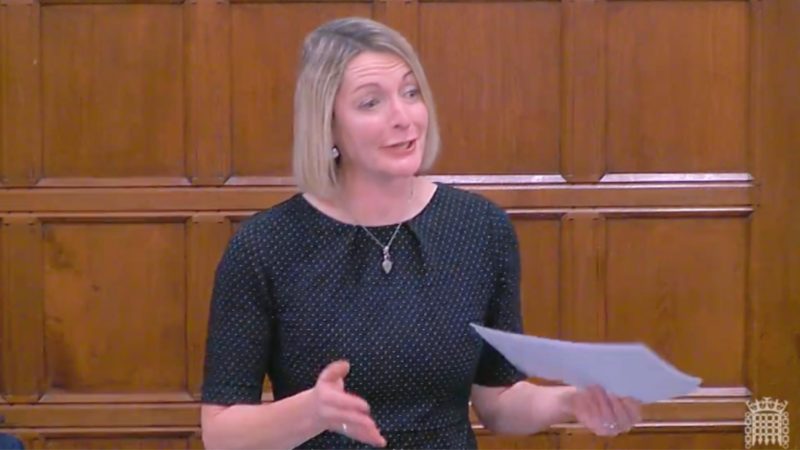Jessica Morden Jessica Morden - Labour MP for Newport East, PPS to Keir Starmer and Shadow Minister for Wales

I am incredibly proud to represent a steel constituency, and the industry has been at the heart of the communities I serve for well over a century why is why I was proud to lead a Westminster Hall debate in Parliament yesterday on the contribution of steel to the UK economy.
Contributing some £2.4 billion directly towards UK GDP, the UK Steel industry underpins our entire manufacturing base and is an essential material for the UK’s automotive, construction, engineering, and packaging sectors. However, as I write, its very existence is under threat and if it is to continue and grow, the Tory government in Westminster needs to drop the warm words and the sticking plaster politics and do something meaningful to help the industry.
Across the UK, the steel sector employs 34,500 people in well-paid jobs, attracting graduates and younger workers looking for high-skilled, well-paid work in one of our country’s core industries. Take for example Tata’s Llanwern steelworks in my constituency of Newport East, where the average age of the workforce has fallen from 53 to 32 in recent years, proving that far from being a dying industry, it’s one that’s had new life breathed into it; an industry that’s very much ready for the future.
Of course, I write in the shadow of the worrying news from Liberty Steel, which has announced that it will idle its steel plants in Newport and Tredegar, as well as making changes at other sites across the UK; a huge blow to the industry and hard news for the highly skilled and deeply dedicated workforce.
And, while I acknowledge that Liberty isn’t without its problems, one of the issues highlighted when the news of idling came was the impact of the cost of energy on steel production, echoing the sentiment I’ve heard from all manufacturers over the years. This is something the UK Government seems to think it can fix piecemeal – and something that has been a true blight on the competitiveness of UK steel producers compared to their continental counterparts; particularly those in France and Germany.
In fact, research from UK Steel has shown that British steel producers paid twice as much for electricity last year than their German counterparts. Even with the government’s freshly announced Energy Bills Discount Scheme in place, UK Steel producers could still be stumping up an additional 63% more than German steel producers for energy.
And this is before we even look at the vital issue of decarbonisation.
The German government has already spent £8.5bn towards greening its domestic steel industry, and the French government has contributed £2.2bn. If this week’s trailed UK Government announcement of £ 600 million to help the sector decarbonise are anything to go by, while welcomed, it still leaves the UK nowhere near close to supporting the industry adequately towards achieving a cleaner, greener future.
All of the challenges I have mentioned above also come against a backdrop of falling demand for steel. UK steel exports have fallen by 16% between 2019 and 2022 with EU exports accounting for the bulk of this drop. Global demand decreasing has also pushed many countries to increase their exports to the UK, placing further pressure on UK producers and increasing the risk of future dumping, which we know has been so damaging in the past. Falling demand in the construction and automotive sectors over the last year has also had a real impact on our domestic sector. That’s particularly true for works like Tata Llanwern in my constituency which produces world-class automotive steel for Jaguar Land Rover and has had to slow down its production over recent months.
On top of this, there’s a continued risk of melted and poured Russian steel entering the UK via third countries. While the UK has banned finished steel imports from Russia and placed a 35% tariff on semi-finished steel from Russia, loopholes in the sanctions mean that Russian steel which is re-rolled in the EU or Turkey and exported into the UK is reclassified as EU or Turkish-origin material – circumventing both the ban and the tariff. This means that UK consumers, including public projects, are unwittingly importing and using Russian steel. It’s wrong as a point of principle and has damaging consequences for the UK market.
If the UK government in Westminster is serious about achieving net zero, then it needs to get serious about British-made steel. Without it there can be no transition to a low-carbon economy, supporting a range of industries from automotive to nuclear and renewables. As Tata has highlighted, almost every aspect of the UK’s decarbonisation plan is steel intensive, with 10 million tonnes of steel needed over the coming years for offshore wind, solar, nuclear, hydrogen and Carbon Capture Utilisation and Storage projects.
It seems that this government doesn’t have a plan for steel – but Labour does.
Our proposal of a £ 3 billion Green Steel Fund represents a potential way forward, working with industry to rejuvenate the sector and to ensure it has a sustainable future with new plants and more new jobs.
The Labour Party has also committed to asking every public body to give more contracts to British firms big and small, using stretching social, environmental and labour clauses in contract design to raise standards and spend and make more in Britain. We’ve also committed to reshoring jobs here in the UK – in the same way, we invest in Foreign Direct Investment now – and leading a culture change in government putting the growth of local industries first and reviewing the pipeline of all major infrastructure projects to explore how to increase the materials made in Britain, upskill workers to get the jobs of the future.
That’s the vision industries like steel need, and that our country needs.
